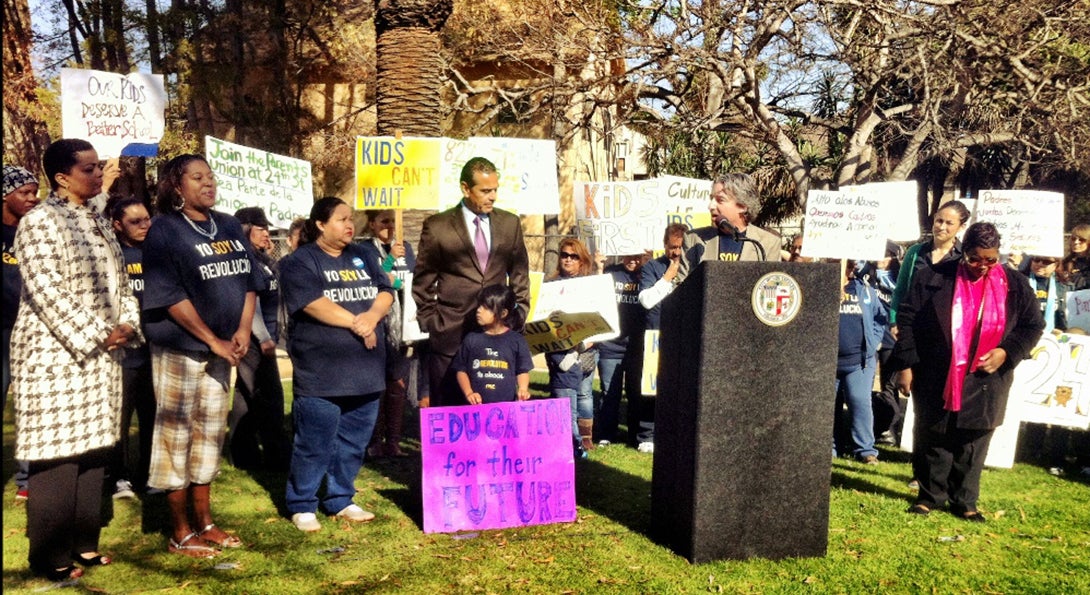Alumna Starts Her Own School

Laura McGowan-Robinson is leading a hybrid public-charter school
Laura McGowan-Robinson always knew she would start her own school. What that school would look like was up for debate—whether it be a charter school or a district-run public school, she simply wanted a forum where the mantle of accountability for the advancement of her students would rest with her.
Today, McGowan-Robinson has realized her dream—she has her own school. It simply does not look like what she ever envisioned before. The 2003 alumna of the University of Illinois at Chicago College of Education, MEd Instructional Leadership-Secondary Education, is leading the hybrid public-charter school in Los Angeles’ Jefferson Park neighborhood as the principal of Crown Preparatory Academy, the 5th-8th grade charter school she founded in 2010.
“I always have believed that demographics do not determine destiny,” McGowan-Robinson (below, speaking) said. “Just because a kid lives in a certain zip code does not mean that should be the foundation of the education they receive.”
Her work as the principal of Crown Prep is informed by her time as an urban high school teacher in Chicago and Los Angeles. She recalls students entering her classes in the 9th or 10th grades at 4th or 5th grade reading levels and her attempt to bring their skills up to grade level in nine months, a task she calls “impossible.” McGowan-Robinson took part in a fellowship program called “Building Excellent Schools,” which included a study of 30 high-performing charter schools across the nation, schools located in areas of high poverty that outperformed both local schools and schools in areas of greater economic resources.
Since April 2013, McGowan-Robinson and LAUSD have worked side-by-side to create this unique new educational place for the Jefferson Park neighborhood. After only four short months to rethink the K-8 process for the area, both schools re-launched in August 2013. The schools wrapped up their first semester in the hybrid model in December 2013.
“When the parents came to us and said, ‘We want you to partner with the district,’ I didn’t know what that even meant because I had never seen it,” McGowan-Robinson said. “It took some time for me to think about it myself, as well as our board, because we were already running a successful school and were worried about jeopardizing the kids we already had.”
The public vs. charter debate in Jefferson Park, a debate over school geography that has traditionally divided communities, states and legislatures, has started to crumble in the nexus of these two schools. The schools’ tenuous relationship has been replaced with frequent meetings between leadership, professional development events, an inculcation of shared values and instructional practices expanding beyond school walls.
“These are things we wanted to grow, so this is huge for the district and a charter to have these types of conversations in just a few short weeks,” McGowan-Robinson said. “We’ve already broken a lot of the us vs. them and the huge divided that exists between charters and districts by focusing on doing what’s best for the kids.”
Under the previous school model, parents of students at 24th Street Elementary could choose to send their children to Crown Prep or to continue with public schooling starting with fifth grade. With the new hybrid model, 24th Street Elementary and Crown Prep teachers are working closely to align their curricular goals and ensure a smooth transition for students from one school to the next. Fourth and fifth-grade teachers collaborate to build complementary lessons, and both schools strive to make teachers from the elementary school available to students entering the charter school to ensure continuity of community.
“Partnering with a large organization working toward the same goal but with different ways to get there, and coming together on common ground and learning to work with each other is a stretch, but it’s a good stretch,” McGowan-Robinson said.